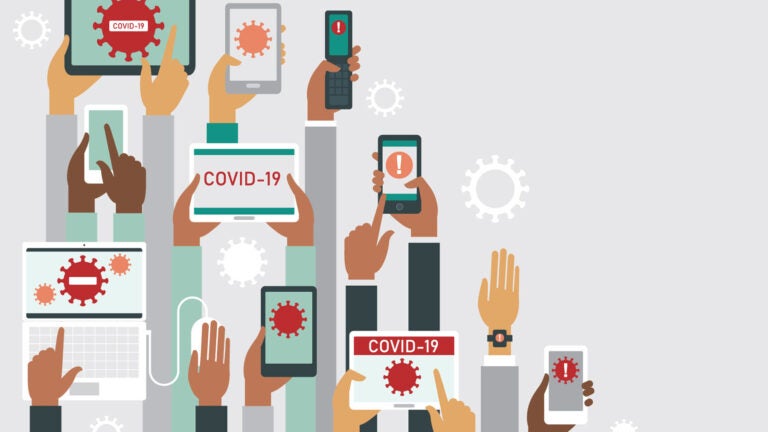
How can high-tech tools help fight COVID-19? USC experts point the way forward. (Illustration/iStock)
USC experts explore new technologies to combat COVID-19
From virtual reality and machine learning to smartphone apps and supercomputing power, researchers are determining which technologies will be the most useful in the battle against the coronavirus.
In response to the coronavirus health crisis, USC researchers have made a hard pivot, adapting labs and lessons learned from treating other diseases to help check the virus and save lives.
At their disposal are numerous technologies that give a human advantage, despite the fast-break spread of COVID-19 once it exited central China and spread across the globe. The disease has afflicted thousands of Californians and poses a serious risk to public health and the world economy.
Among tools at their disposal, USC scientists and engineers turn to new technologies unavailable during past pandemics. Tools such as supercomputers, software apps, virtual reality, big data and algorithms are now in play. They are using the tools to find ways to search and destroy coronavirus DNA, turn smartphones into personal protection devices and use people-friendly simulators to help cope with the crush of medical cases.
Virtual humans can help doctors and nurses respond
At the USC Institute for Creative Technologies in Playa Vista, computer scientists are developing virtual reality and simulated human characters as part of the effort.
Sharon Mozgai, associate director of medical VR, is adapting a “battle buddy” virtual human agent the ICT developed for the military for the coronavirus outbreak.
“ICT has extensive experience in the development of virtual human and VR applications for humans that are very well suited to help with coronavirus,” she said.
The “battle buddy” virtual human agent can interpret data from wearable devices, analyze language responses, administer psychological assessment questions and respond accordingly. It could be used to screen sick patients, monitor patient recovery or help hospital staff answer calls or patient questions.
Mozgai says those are important skills needed now, when hospitals are under pressure to handle rapidly growing patient demands. The agent could also provide comfort for people under quarantine.
Kids can use technology to learn coronavirus safety
Down the hall from Mozgai’s office, Albert “Skip” Rizzo is developing a VR game to help children avoid the contagion. Rizzo is the director of medical VR at the ICT and research professor at the Keck School of Medicine of USC and the USC Leonard Davis School of Gerontology
“We’re designing a low-cost coronavirus VR game for kids called COVID Escape Room, an obstacle course where safe behaviors — social distancing, washing your hands and covering a sneeze — are rewarded. Kids learn to navigate the course and learn real-world behaviors to avoid coronavirus and do it in a fun way,” he said.
Rizzo said VR is already used to help people learn new behaviors, and simulators have proven more effective than books in some teaching applications. Kids and teens would need a VR device for the new game, which would cost about $200. The game could also be adapted to other health needs.
Using machine learning to find potential COVID-19 drugs
In a laboratory at the USC Viterbi School of Engineering, computer scientists are applying machine learning to expedite drug discovery for the treatment of coronavirus.
Paul Bogdan, an associate professor of electrical and computer engineering, and collaborators have long used mathematical models and multifractal geometry to study complex networks in the brain and drug-to-drug interaction networks, in particular. Using FDA-approved drugs, they examine the interactions, looking for drugs that might be useful to treat another disease.
How does it apply to coronavirus?
We’re trying to repurpose a drug from fighting one disease to fighting a different disease.
Paul Bogdan
In their research, they sometimes find a drug designed for one purpose has an unintended benefit. They say the same method can be applied in the search for a drug that may be used for the treatment of COVID-19.
“We’re trying to repurpose a drug from fighting one disease to fighting a different disease, which in this case is the coronavirus,” Bogdan said.
They are exploring multiple potential mechanisms, including the drug best able to attack the coronavirus DNA or one that can stop the virus from making the proteins it needs to reproduce itself. Find that, Bogdan says, and you may be able to stop the coronavirus in its tracks.
For now, it’s a big math problem, and Bogdan says he expects his team could get close to a solution in several weeks. After that, more powerful computers will be needed to run more tests and identify which drugs have the best chance of success — a task that will take a few months.
Smartphone apps could monitor symptoms and track COVID-19 spread
Meanwhile, other researchers are developing technologies that would empower individuals to combat coronavirus by availing the power in ubiquitous smartphones.
Two similar and loosely related projects are underway at USC.
At the USC Michelson Center for Convergent Biosciences, Peter Kuhn is working on an app to monitor a person’s symptoms and location and cross-reference that with information about others the individual may have crossed paths.
“We’ve teamed with a Bay Area company to make a phone app to record and analyze coughs and symptoms and compare it to an individual’s social interactions using GPS,” he said. “It’s all about using data from individuals that becomes a source we can use to help stop the spread of coronavirus.”
The data can help identify sick people and prevent the spread of disease. It would have built-in privacy protection measures that will be included in the app. The origin of the app is based on previous research at USC’s Convergent Science Institute in Cancer (CSI-Cancer), which tracks health performance across populations. CSI-Cancer is partnering with San Francisco-based HealthMode to develop the app.
In a parallel project, experts at USC Viterbi are developing a smartphone app to alert people when they’ve been near an infected person.
Behind that project is Bhaskar Krishnamachari, a professor of electrical engineering and computer science and director of the Center for Cyber-Physical Systems and the Internet of Things.
“We have to find a way to identify specific groups of people that should be practicing social distancing or get tested because we don’t have resources to test everyone and it may not be economically feasible to keep everyone at home for a long time. We need more precise instruments to see who should stay home or get tests, and a privacy-sensitive smartphone app for contact is one such instrument,” he said.
He said the app would alert its owner so the person can act by seeing a doctor or staying indoors. Balancing the need to protect public health and the right to privacy is a challenge, which encryption and anonymization technologies can solve.
Better tracking and testing for COVID-19 could help allocate scarce resources, achieve more targeted treatment and gain better health protection.
Computing power: How technology can triumph over coronavirus
One of the biggest advantage humans have over viruses is computing power.
“Supercomputers are 100 times faster than a decade ago. COVID-19 spike protein simulations in various scenarios can run in one day on current supercomputers, rather than weeks and months. Next year, we will have exascale supercomputers 100 times faster than today,” said Priya Darshan Vashishta, Dean’s Professor in Chemical Engineering and Materials Science, Computer Science and Physics and Astronomy at USC Viterbi.
For example, supercomputing might help answer questions more quickly to find a vaccine for COVID-19.



